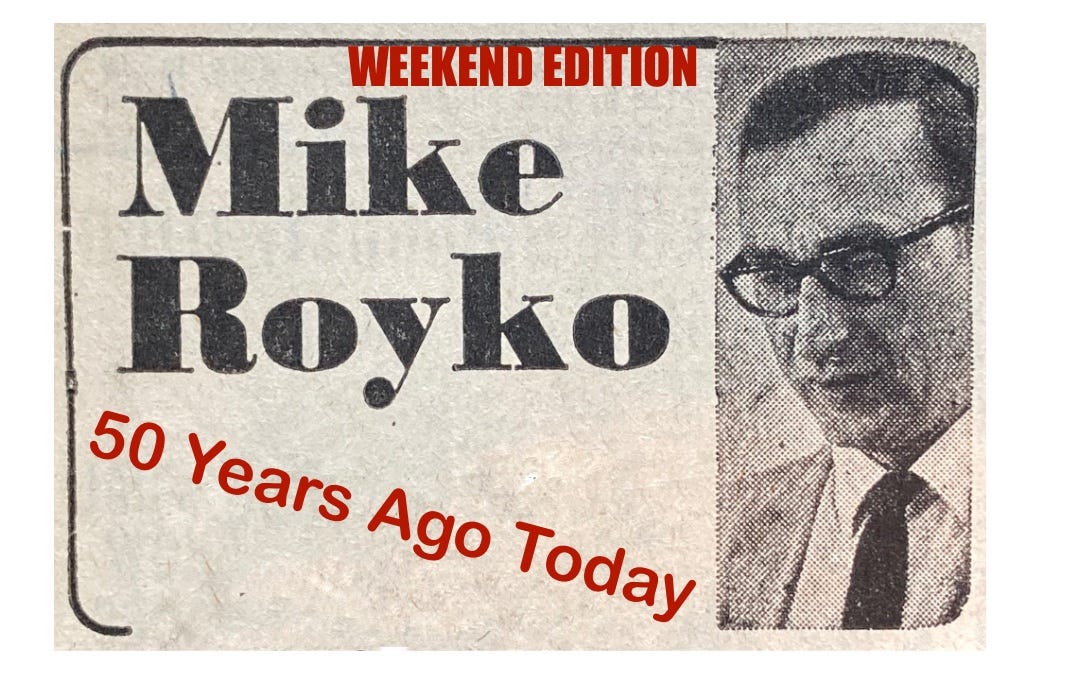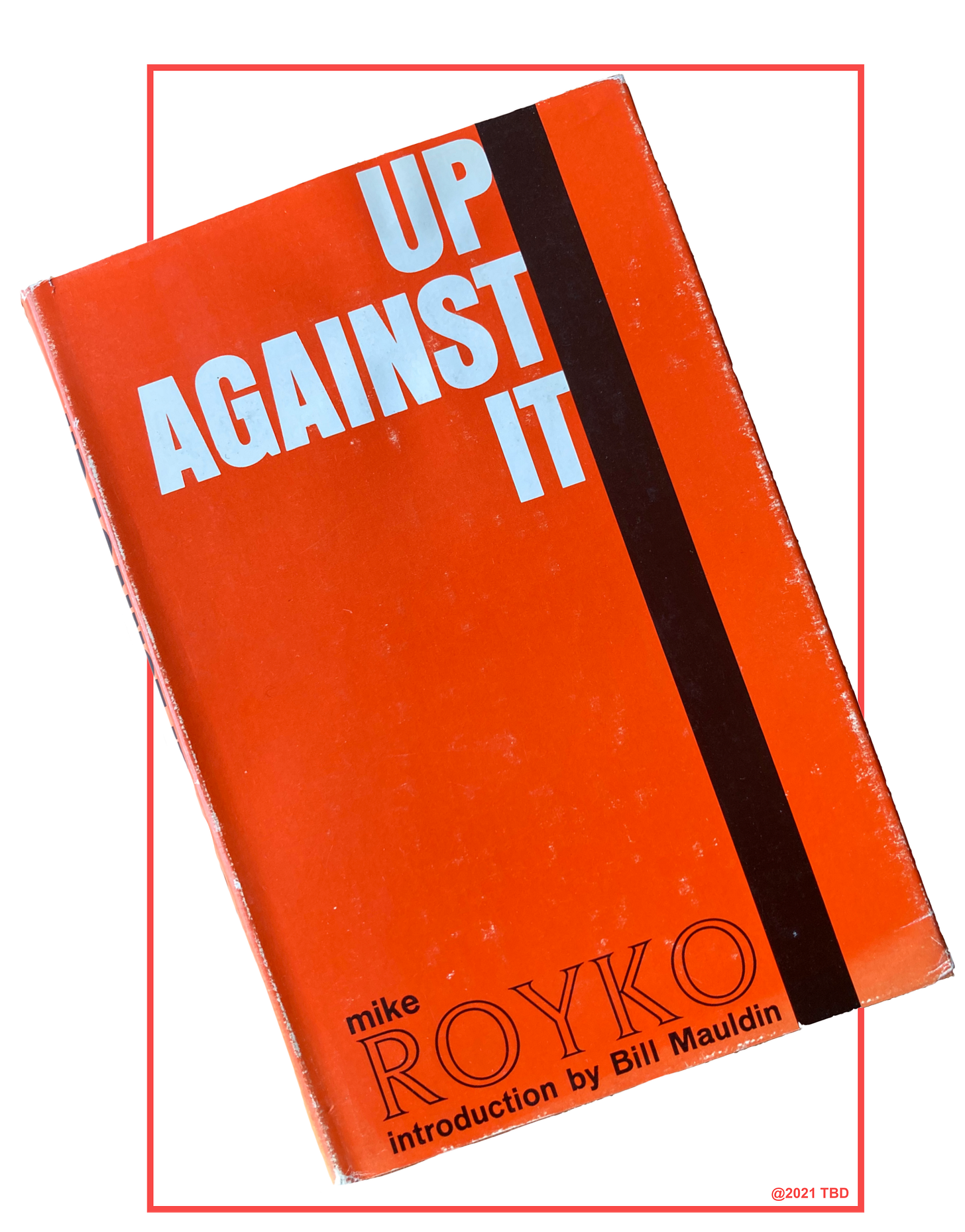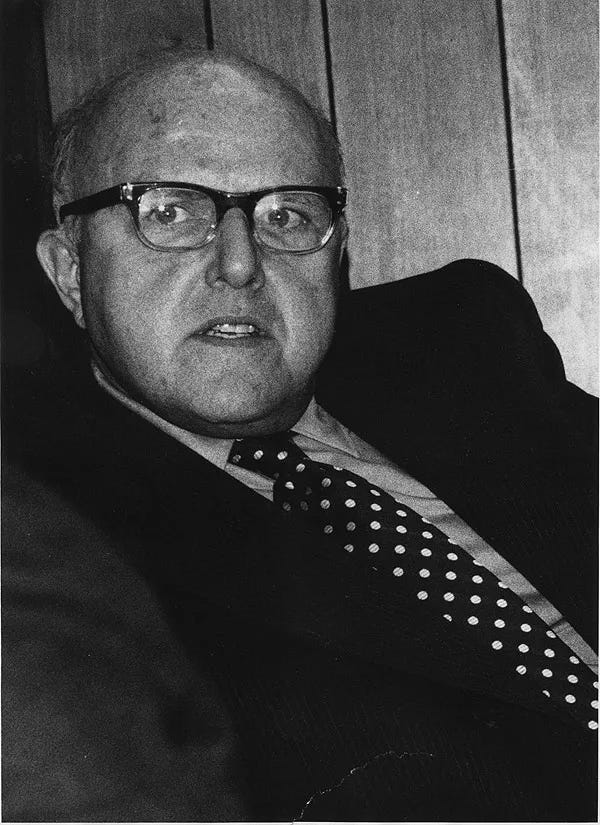Mike Royko 50 Years Ago Today: Ed Muskie's new "new"
Weekly Compilation January 3-January 9, 1972
To access other parts of this site, click here for the Home Page.
Why do we run this separate item, Mike Royko 50 Years Ago Today? Because Steve Bertolucci, the hero of the serialized novel central to this Substack, “Roseland, Chicago: 1972,” lived in a Daily News household. The Bertolucci’s subscribed to the Daily News, and back then everybody read the paper, even kids. And if you read the Daily News, you read Mike Royko. Read the daily Royko briefing Monday-Friday on Twitter, @RoselandChi1972.
January 3, 1972
‘Patriotism’ at the Stadium
This is one of those columns where Mike tells us a story about an unnamed man who is not himself, but clearly his alter ego acting out his deepest beliefs or wishes.
An unnamed man goes to a football game and doesn’t stand for the national anthem. “The band began playing. The singing was led by a TV star who had been up all night drinking gin. Ten jets swooped over the stadium. Fifty majorettes thrust out their chests.”
The man read his program, seated. The crowd around him became outraged.
“I don’t believe in singing it at commercial events,” the man explained. “I wouldn’t sing it at a nightclub, or in a gambling casino, and I won’t sing it at a football game.”
The enraged crowd calls him a radical. “I won’t be a stadium patriot,” he insists. The crowd gets a cop, who arrests the man. He’s charged with disorderly conduct and pays a $25 fine.
The man attends the Stupendous Bowl. This time he stands and sings at full throttle—going on to all the stanzas of the song until the enraged crowd calls him a radical and gets a cop, He’s arrested and charged with disorderly conduct.
Finally the man attends the Amazing Bowl, where the anthem is sung by a rock star “who had been up all night with three groupies.” And now everything is fine, because the man acts like a real American—though Mike of course lets us figure that out without saying it:
“As the music played, he moved his lips because he was chewing peanuts, and he stared at the chest of a majorette…The man in the next seat offered him a sip from his flask.”
January 4, 1972
Women’s Lib going berserk
Deep breath. You aren’t used to hearing people kid about women’s rights, or aren't used to it anymore, depending on your generation. But Mike is kidding, and that kidding is aimed at people afraid of equal rights for women.
For Younger Readers: In 1972, "Women's Lib" was the accepted term for the idea that women are full human beings entitled to equal rights under the law and in society. Like a tonal language, its situational meaning was all in the pronunciation--which often as not was pejorative. It’s 1972, Jake.
Mike’s lede: “There are men who laughed at Women’s Lib. They thought it was a joke about bras....Many men thought it merely meant scantier clothes, unfettered chests, and women buying their own drinks."
But now, in today’s parlance, it’s getting real.
Chicago’s last divorce of 1971 was granted for physical cruelty. The first one of 1972 was for abandonment. (In those days you had to go to court with a good reason for a divorce.) And in both those cases, wives were the guilty parties.
Then there’s the yearly poll of the women most admired by other women. In 1970, it was Mamie Eisenhower, unassuming spouse of President Eisenhower. In 1971, it was Israeli Prime Minister Golda Meir.
“Mrs. Meir has been around a long time,” writes Mike. “So why the sudden popularity? I’ll you why. All year she has been buying bombs and jet fighters, scaring her enemies and being recalcitrant….Women liked that. Now it is the hawks, rather than the old hens, who are the heroines.”
“It should be noted, however, that Patricia Nixon finished a strong second both years. She probably gets a big sympathy vote.”
As Mike opines, “in almost all revolutions, some people go too far. So we have husband-abandonment, husband-beating, and a lust for war. Responsible leaders, such as Gloria Steinmen and Betty Friedan, should renounce such excesses. Their movement will not be helped by female chauvinist sows.”
January 5, 1972
Muskie coins a ‘new new’
Mike assesses presidential candidate Edmund Muskie’s campaign slogan.
“Sen. Edmund Muskie has cleared one hurdle in his quest for the Presidency.
“He has come up with a new new.
“His new new is a ‘New Beginning.’ This is what he will provide us with if we elect him.”
Mike goes over the previous news—the New Frontier, the New Deal. LBJ didn’t offer something new, but he “came close” with the Great Society because “If it had come to pass, it would have been new.”
However, Mike thinks Muskie’s slogan is bland. “That’s to be expected, though, because Muskie is only slightly more charismatic than President Nixon, who is only slightly more charismatic than a poached egg.”
“The basic weakness in Muskie’s offer of a ‘New Beginning’ is the implication that we will have to go back to some point and start over again. Most of us are too tired for that.”
January 6, 1972
Why they OKd the petitions
“It’s time for another Chicago-style civics lesson, children,” writes Mike. “So gather around the spittoon.”
Mike’s Q&A is about the ongoing gigantic scandal he broke the story on—Machine flunkies spent a day forging signatures for petitions to get Traffic Judge Raymond Berg on the ballot for state’s attorney after Mayor Daley endorsed Berg instead of indicted incumbent Ed Hanrahan.
The IVI challenged the petitions, and successfully sued to get voter records to compare signatures with the petitions. But the IVI couldn’t finish the work before its hearing yesterday with the Electoral Board, because the Board of Elections took too long “trying”to find the voter records. The IVI asked for an extension. The Electoral Board took literally 90 seconds to say no, and dismissed the challenge.
We, the confused readers, ask the questions. Wise Mike answers.
Q – Were all the signatures fraudulent—all 20,000 of them?
A – I doubt that. Berg surely signed his own name.
Q—But if there was fraud, why did the Electoral Board throw out the complaints?
A—Because the Independent Voters of Illinois didn’t have its evidence ready.
Q—Why didn’t they have the evidence ready?
A—Because City Hall’s election office didn’t work fast enough in finding voter registration cards, so comparisons of signatures could be made.
Q—Then how could the IVI prepare its evidence?
A—It couldn’t.
Q—Just a moment. I’m getting confused.
A—Then you are a good citizen.
Q—Then why did the Election Board throw out the IVI’s complaints?
A—I told you. Because the IVI didn’t have its evidence ready.
Q—Are you trying to drive me crazy?
A—You really are a good citizen.
January 7, 1972
The police get their man
Oh dog lovers, you might want to skip this. It’s so hard to read.
Mike tells the story of Robert Sheppard, who lived “in a fine, old, two-story house on the Far South Side” with his dog, Beau.
“Beau was the kind of dog to have if you must live alone in a house in modern Chicago. Besides being well-trained, and a good companion, Beau was 90 pounds of alert, fearless watchdog.”
One night Sheppard went out. A neighbor saw a stranger go into his house, and called the police. Beau chased the burglar into an upstairs bedroom. The burglar was trapped, with Beau outside the door barking bloody murder.
When the police car pulled up outside, the burglar called police from a bedroom phone, claiming he’d run into a strange house after being chased by street thugs, and was now trapped by a dog. The neighbor told the police on site that it sure looked like a burglar. But--
“That’s when the police went into the house,” writes Mike. “Beau, of course, would not know a policeman from a prowler…One of them shot Beau. It took two bullets to stop him. And a third to put him out of his pain.”
Maybe you can give the police a pass so far. But then they left Beau’s dead body on the driveway and just left. When Sheppard called animal control to pick Beau up, they just laughed at him.
“It wasn’t until I phoned the person in charge, and volunteered to pick the body up and deposit it on his desk,” writes Mike, that the city picked Beau up.
Mike concludes that of course, the police could have waited—the burglar wasn’t going anywhere. Or they could have used a tranquilizer gun.
“To use a phrase that is very popular among policemen when they explain a questionable act, Beau was just doing his job.”
As we here all know, weekends could be sad for a Daily News family because Mike Royko wasn’t in the Daily News’ single weekend edition. So we look for Mike elsewhere on weekends.
Back to Mike’s first collection, for a column that was especially beloved by the dad of one of Steve’s best friends, Jack Cassero, who lived down the block. Mr. Cassero was a Chicago garbageman, and not that many people stick up for the garbagemen.
(See the Weekend Edition at the end of this Royko weekly compilation for a longer look at “Up Against It" and Mike himself in the year the book came out, 1967.)
Down the alley of life
Ald. John Hoellen is the lone Republican in the City Council at this time, always a lonely job. Normally Mike has sympathetic words for Hoellen, but not today, because he said something “unkind” during a Council meeting.
In arguing for overtime pay for police and firefighters, Hoellen declared: “Neither the policeman nor the firemen receives time and one-half for overtime—even though the garbage truck driver does.”
Every kind of municipal worker goes before legislative bodies demanding raises and comparing their pay to garbagemen, writes Mike.
“The implication is that nobody in the world, especially somebody who wears a shirt and tie and clean socks to work, should be paid less or even the same as the garbageman. It is meant to shock the listener, to make him aware of the financial injustice.”
“I don’t know what Hoellen thinks garbagemen do all day. Maybe someone has told him that they toe dance down the alleys, sniffing backyard roses and listening to transistor radios.
“But for his information, they spend all day messing around with garbage—G-A-R-B-A-G-E.”
Day after day, says Mike, the garbagemen go down alleys lined with endless garbage cans. “They meet crawly things….They lose their sense of smell….They never hear a kid say, ‘I want to grow up to be a garbageman.’”
“….But the garbageman doesn’t complain. He just moves steadily down the alley of life, hauling away your leftover cheese-dip.”
The garbagemen have an awful job, but they never insult other professions. They never, for instance, “point out that the only time an alderman lifts something heavy and disposable is when he gets up and goes home.”
Hoellen, says Mike, is usually a nice guy, and perhaps we can’t blame him.
“As the mothers always say to the judge:
“He’s really a good boy—it’s just the bad company he keeps.”
Don’t forget Reader Contest #1, see details HERE!
By the way, this feature is no substitute for reading Mike’s full columns. He’s best appreciated in the clear, concise, unbroken original version. Mike already trimmed the verbal fat, so he doesn’t need to be summarized Reader’s Digest-style, either. Our purpose here is to give you some good quotes from the original columns, but especially to give the historic and pop culture context that Mike’s original readers brought to his work. You can’t get the inside jokes if you don’t know the references. Plus, many columns didn’t make it into the collections, so unless you dive into microfilm, there are some columns covered here you will never read elsewhere. If you don’t own any of Mike’s books, maybe start with “One More Time,” a selection covering Mike’s entire career and including a foreword by Studs Terkel and commentaries by Lois Wille.
Do you dig spending some time in 1972? If you came to MIKE ROYKO 50 YEARS AGO TODAY from social media, you may not know it’s part of the book being serialized here, one chapter per month: “Roseland, Chicago: 1972.” It’s the story of Steve Bertolucci, 10-year-old Roselander in 1972, and what becomes of him. Check it out here.
To get MIKE ROYKO 50 YEARS AGO TODAY in your mailbox weekly along with THIS CRAZY DAY IN 1972 and new chapters of the book—
SUBSCRIBE FOR FREE!
















